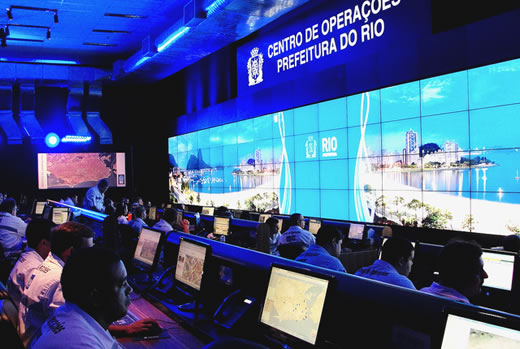
Homeland security is of primary concern for Brazil. Spanning over 8.5 million square kilometers this huge nation is bordering ten neighboring countries over 17,000 kilometers of land borders, many of which lay over sparsely inhabited areas, posing a great challenge for law enforcement and control. Brazil’s homeland security market has grown significantly in recent years and is expected to surpass the national investment in defense, as the country is laying the infrastructure to support major international events in coming years.

The main areas of investment in border security are communications systems, surveillance equipment, intelligence support, physical protection and transport security. Among major projects currently underway, are the construction of new security command and control centers supporting sports events.
Among these events are the World Military Games to be held in July in Rio de Janeiro later in 2011, hosting 5,000 athletes from 110 countries. The FIFA World Cup planned for 2014 will take place in 12 venues across the country. Brazil is expected to spend US$2.8 Billion on security and over $8.6 Billion on infrastructure improvements toward these games. By 2016 Brazil will host the summer Olympic Games. Toward this event, the country will spend additional $1.4 billion on security and $10 billion on venues and infrastructure.
The pressure on defense expenditure is also reflected by the growing needs in supporting internal security, emergency and civil recovery, following a series of floods that devastated large urban areas. A new structure implemented within the armed forces promotes better coordination among various branches, enabling the military to better assist internal security operations, in support of law enforcement programs undertaken by the federal and local authorities.

Law enforcement campaigns launched by the states, in an effort to dominate neighborhoods ruled for years by outlaws, has also consumed a combined effort by state and federal law enforcement agencies, supported by the military. “The Brazilian authorities understand this determined effort is imperative now, preparing the country for major international sports events beginning 2013.”
Overall, Brazil’s HLS efforts are directed at bolstering border security, routing criminal activities from rural and uninhibited areas and neighborhoods, and improving command and control over key regions, in preparation to the world cup and Olympic games (2014-2016). Infrastructure improvement investments are allocated in 12 states and regions, in support of the games, include transportation improvements, seaport and airport expansion, construction of stadiums, hotels, communications networks and associated security measures required for their safe operation.
“These investments in infrastructure, transportation, command, control and surveillance networks associated with ‘safe city’ programs, national command control and communications (C3) and extensive training are being implemented in the next 3-4 years to meet the growing demand for security” says Leo Gleser, a homeland security consultant involved with domestic programs in Brazil and Latin America. “These assets will remain in Brazil after the games, and drive the country’s economy forward… Brazil has everything they need in terms of industrial and production capability, what they need now is know-how and technology to implement these needs in time and at the high quality required for the tasks ahead. This is a great opportunity for international companies seeking to establish presence and cooperate with the Brazilian industry” Gleser added. His company ISDS operates in 17 countries around the globe has recently established its operating offices in Rio de Janeiro, to tap the growing demand in the Brazilian market.
“The Brazilian market represents a complex matrix of responsibilities and authorities that may confuse a foreign newcomer” says Gleser. Apart from the three military arms, there are numerous law enforcement and investigation authorities in Brazil, each requires its own command, control and communications, operational assets, training and support. Different Brazilian police departments are operating at federal and state levels, internal affairs or investigative, civil and military tasked with counter terror and anti-riot or transportation police and more. There are over 16 intelligence agencies operating in country. In the past these multiple intelligence agencies operated independently, along with specific political agenda but this is changing in recent years, with intelligence agencies refocusing more on their original tasks. In supporting these activities, intelligence agencies are open for acquiring advanced intelligence gathering tools, including datamining, archiving, analytic processing, and investigative processes.

















